 Petzlover
Petzlover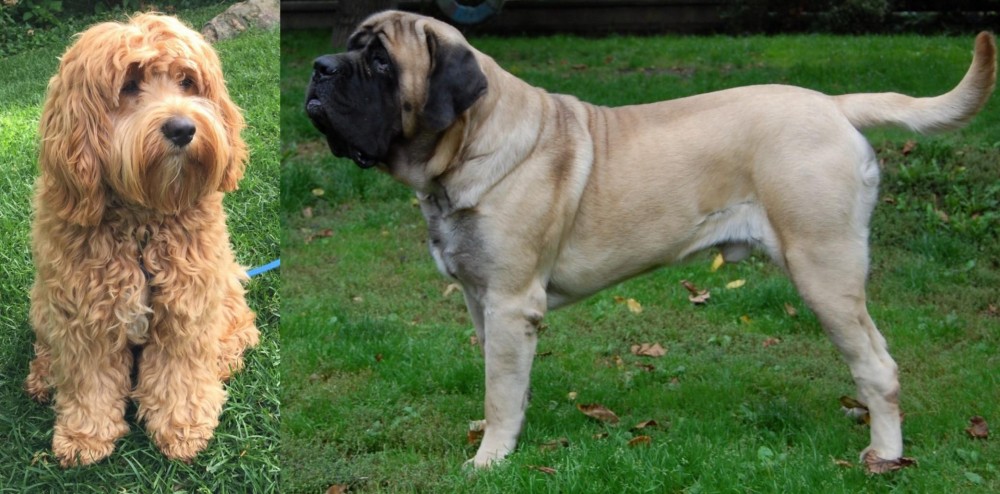 Cockapoo is originated from United States but English Mastiff is originated from United Kingdom. Cockapoo may grow 38 cm / 14 inches shorter than English Mastiff. Cockapoo may weigh 102 kg / 224 pounds lesser than English Mastiff. Cockapoo may live 3 years more than English Mastiff. Cockapoo may have less litter size than English Mastiff. Cockapoo requires Moderate Maintenance. But English Mastiff requires Low Maintenance
Cockapoo is originated from United States but English Mastiff is originated from United Kingdom. Cockapoo may grow 38 cm / 14 inches shorter than English Mastiff. Cockapoo may weigh 102 kg / 224 pounds lesser than English Mastiff. Cockapoo may live 3 years more than English Mastiff. Cockapoo may have less litter size than English Mastiff. Cockapoo requires Moderate Maintenance. But English Mastiff requires Low Maintenance
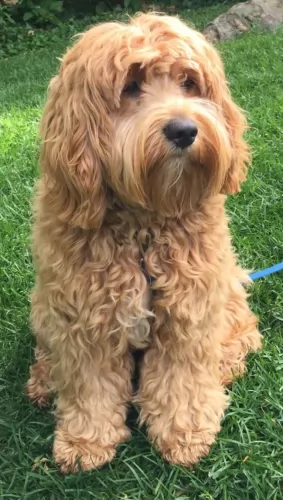 The gorgeous Cockapoo is a mixed-breed dog. He comes from mixing the Cocker Spaniel with a Poodle.Both these dogs have their own histories.
The gorgeous Cockapoo is a mixed-breed dog. He comes from mixing the Cocker Spaniel with a Poodle.Both these dogs have their own histories.
Known as a ‘designer dog’, the Cockapoo has been around since the 1950s in the United States already, although pure-breed associations don’t recognize the Cockapoo. There are some dog clubs that are working to establish the Cockapoo as a recognized breed.The Cockapoo Club of America was founded in 1998.
 Throughout most of history there have been images created by people of very large, sturdy dogs that they shared their space with. The English Mastiff can trace some part of her ancestry to these same dogs. This breed is thought to have come from the stock of ancient breeds such as the Alpine Mastiff, Pugnaces Britanniae and Alaunt. The Mastiff in general has then become a main descendent of many other breeds of dogs since the 1880’s. The images of these types of dogs goes back to the 5th and 6th century.
Throughout most of history there have been images created by people of very large, sturdy dogs that they shared their space with. The English Mastiff can trace some part of her ancestry to these same dogs. This breed is thought to have come from the stock of ancient breeds such as the Alpine Mastiff, Pugnaces Britanniae and Alaunt. The Mastiff in general has then become a main descendent of many other breeds of dogs since the 1880’s. The images of these types of dogs goes back to the 5th and 6th century.
There is no genetic evidence linking these dogs to the modern Mastiffs and the English Mastiff, but the resemblance is obvious. There is anecdotal evidence that these Mastiff type dogs were exported from England – the English Mastiff – to Greece to hunt game but were also used as war dogs by the Celts. The Alaunt was probably used the Normans and bred by the Alans. Writings and images throughout these times depicted a dog that looked very much like today’s English Mastiff. Some speculate that the English Mastiff came to the United States of the Mayflower.
There was a decline in the English Mastiff in its homeland in the 1800’s following the Cruelty to Animals Act of 1835 which prohibited owners and trainers from baiting animals. Then in the 19th century, prior to the first World War, systematic breeding programs began with J.W. Thompson. His first English Mastiff was a female named Dorah. Dorah’s ancestors included dogs from Thompson’s Grandfather. Captain John Garnier of the Royal Engineers also had dogs that contributed to the development of the English Mastiff.
During this time some breeders got away from pure type and began to breed for other factors. In the late 1800’s, Edgar Hanbury and Mark Hanbury Beaufoy began restoring the breed to its original soundness. One of their dogs was exported to the US were breeding to soundness continued until the First World War reduced the number of English Mastiffs around the world. By the time the war ended there were no English Mastiffs outside of England.
There was a dog in Canada named Beowulf and direct descendent of imports from Britain, who came to the States after the war and began to re-establish the breed on this continent and registered with the American Kennel Club. Yet as of 1945, the contribution from North
Breeding was stopped again for World War II and started again after the war. Many of these puppies died of distemper. Only one female had pups that were able to grow up into adults. North America sent dogs to England at this time and all of the Mastiffs from that time, could be traced back to Nydia and the 14 North American Mastiffs. Since then the breed has been restored slowly in Europe, North America and everywhere in the world.
The English Mastiff is known by his massive head with a black mask and comes in a wide variety of colors. He is also known as a gentle giant because of his personality and the love he has for his people.
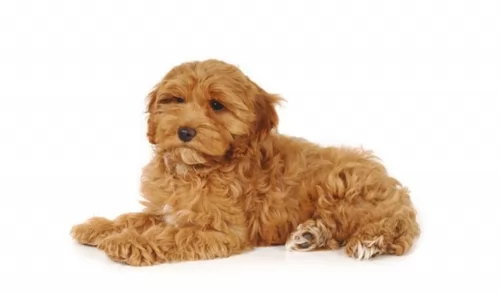 The Cockapoo is a mixed breed- or hybrid dog that has become very popular in recent years. He is a small dog, but robust, and stands between 25 – 38cm in height and weighs between 5 and 11kg.
The Cockapoo is a mixed breed- or hybrid dog that has become very popular in recent years. He is a small dog, but robust, and stands between 25 – 38cm in height and weighs between 5 and 11kg.
The Cockapoo has floppy ears, and the tail has always been docked to give the dog an attractive, distinctive look. Without tail docking, the natural tail is long.
The coat color of cockapoos is varied and can be anything like tan, white, cream, blonde, brown or black and sometimes even a combination of these colors. Cockapoo coats can vary from silky smooth to tight curls, although they usually fall somewhere in between.
He is a low shedder and you’ll often hear him being described as hypoallergenic, which is an advantage for Cockapoo owners who might be allergic to pet hair.
He is small and robust, always ready for a game and is loving, with a sweet, alert expression on his face. Even as an adult, his antics and looks make one think that he is just a big puppy.
He makes a wonderful pet and gets on well with adults and children as well as other pets. He is intelligent and can be easily trained, and when you shower him with attention he is a happy, energetic, social, fun-loving dog who goes out of his way to please you and be the perfect pet.
The personality of the Cockapoo isn’t set in stone and while one dog may be territorial and somewhat aggressive, others aren’t. Many dogs simply turn out according to the way they are raised.
 The English Mastiff is a giant dog with a broad head and body. In terms of mass it is the worlds largest dog, just a little bigger that the Saint Bernard. The Great Dane and the Irish Wolfhound are 6 inches taller but do not carry the weight and bulk of the Mastiff. Mostly square in his body and his head with a massive chest and wide set forelegs. The head is square and very large. No matter the color of the coat, the face should have a black mask like the St. Bernard. His eyes and nose are also dark.
The English Mastiff is a giant dog with a broad head and body. In terms of mass it is the worlds largest dog, just a little bigger that the Saint Bernard. The Great Dane and the Irish Wolfhound are 6 inches taller but do not carry the weight and bulk of the Mastiff. Mostly square in his body and his head with a massive chest and wide set forelegs. The head is square and very large. No matter the color of the coat, the face should have a black mask like the St. Bernard. His eyes and nose are also dark.
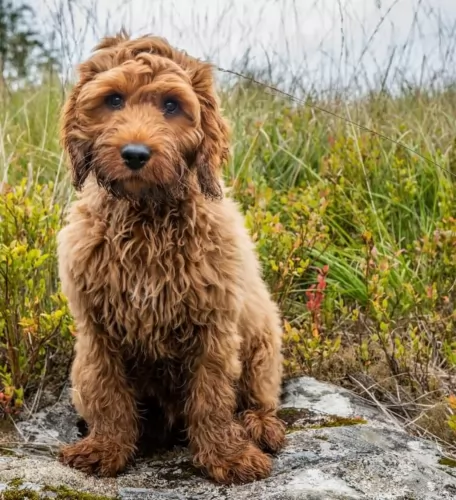 Cockapoos have become popular pets because they have a host of good qualities from both the breeds that make this pet – the cocker spaniel and the poodle.
Cockapoos have become popular pets because they have a host of good qualities from both the breeds that make this pet – the cocker spaniel and the poodle.
They are jaunty, sweet looking, amicable, social, fun-loving, devoted, loyal, loving and low-shedding as an added perk. He loves spending time with his human family and will become unhappy and bored if he isn’t made to feel absolutely part of the family.
Look after your Cockapoo, because when you provide him with good food, you take time to exercise him and you love him to bits, you’ll find that you’ve got in him all the makings of a wonderful friend.
 The English Mastiff is very happy to play with children. You willl need to be careful with small children as he does not know his size and is likely to sit on them.
The English Mastiff is very happy to play with children. You willl need to be careful with small children as he does not know his size and is likely to sit on them.
This lovable giant is noble and loyal. He will protect his family and he will be courageous about it.
This is a big dog but he doesnt live outside. You need a big yard and perhaps a big house. He may not adapt to an apartment.
The English Mastiff is smart and certainly trainable. He can be independent and stubborn at times but he has the ability to learn.
 The Cockapoo is generally a healthy, good tempered, mix-breed dog and with good care he can live to be anything from 13 – 15 years of age and even older.
The Cockapoo is generally a healthy, good tempered, mix-breed dog and with good care he can live to be anything from 13 – 15 years of age and even older.
Although you’re not likely to find any serious health problems with the Cockapoo, it is wise to know that there are many common dog illnesses that attack any dog, including the Cockapoo. Some of these are hip dysplasia, ear infections, dental disease which can affect other parts of the body as well as eye disorders.
Referring to ear infections, as a long-eared dog, the ears will need to be cleaned with the Cockapoo to avoid ear infections. Simple cleaning methods are explained at the veterinarian. Some eye conditions like progressive retina atrophy are common in both the dogs that make the Cockapoo.
 Being a massive dog can take its toll on the body’s development and that is certainly true of the English Mastiff. A lot of running is not recommended in the early life of the dog – preferable for the first two years. This could damage the joint’s growth plates and cause him a lot of problems in later years. Too much exercise in this massive dog can hurt him but so can, not enough exercise.
Being a massive dog can take its toll on the body’s development and that is certainly true of the English Mastiff. A lot of running is not recommended in the early life of the dog – preferable for the first two years. This could damage the joint’s growth plates and cause him a lot of problems in later years. Too much exercise in this massive dog can hurt him but so can, not enough exercise.
Some of the health issues other than this that the English Mastiff is prone to include:
A large dog like the English Mastiff is always prone to pain from arthritic joints. See your vet about pain medication.
A spot under the skin that is swollen and filled with fluid. Can be treated. It is not an infection or contagious.
Can result in lameness and arthritis.
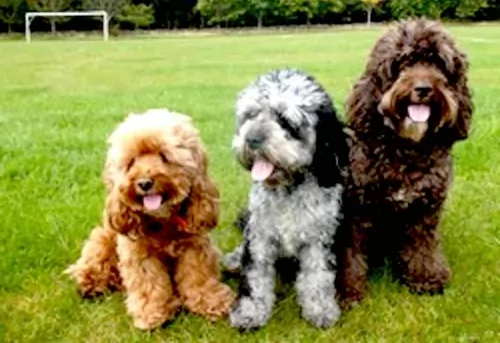 The Cockapoo can have a long, straightish coat or it can be wavy or curly. The coat will need a good brushing at least twice a week to avoid matting. He may well need a trip to the doggy parlor to have his hair professionally clipped.
The Cockapoo can have a long, straightish coat or it can be wavy or curly. The coat will need a good brushing at least twice a week to avoid matting. He may well need a trip to the doggy parlor to have his hair professionally clipped.
What is also noticeable about this dog is that he is odorless too. Bathing him doesn’t have to be a regular occurrence at all, as too much bathing strips the coat of its natural oils, irritating and drying out the skin.
The Cockapoo is an energetic little dog and he will require exercise from you. Make it fun for him seeing that he is a fun loving dog, and take him on walks and have ball games with him.
There are many different commercially produced dog foods, and some of the top quality ones offer an excellent mix of meat, fish or poultry in them with vitamins and minerals.
These top quality foods are usually found at your vet or in special pet stores and are not ordinarily found at the supermarket. Make sure to feed your Cockapoo the right amount of food according to the label on the packaging.
You can also include cooked brown rice, vegetables and chicken into his kibble to give him some variety and give him some raw meat in his diet from time to time. This will help with avoiding skin allergies. Make sure he always has access to clean, cool water.
 This is an enormous dog that grows quickly. It is important to feed them properly as they grow. If he doesn’t get what he needs as a puppy you will not be able to make it up to him later on.
This is an enormous dog that grows quickly. It is important to feed them properly as they grow. If he doesn’t get what he needs as a puppy you will not be able to make it up to him later on.
The English Mastiff puppy needs good nutrition for growing properly.
From 12-16 weeks of age feed him 3-4 cups a day of a high protein, high quality dry food. Break this up into 3-4 meals.
From 4 -6 months of age feed him 8-10 cups a day of a high protein, high quality dry food. Break this up into 2-3 meals.
From 6-18 months of age feed him 8-12 cups a day of a high protein, high quality, dry food. Break this up into 2-3 meals.
The English Mastiff is still growing from a year to 18 months. Starting at 18 months feed him 10-12 cups a day of high protein, high quality dry food. Break this up into 2 meals.
As your Mastiff ages, cut down on the protein and feed a dry food appropriate for his age.
The English Mastiff is a very large dog that should not be allowed to get obese since he is prone to dysplasia. He needs protein throughout puppyhood and until he is about 8-10.
This is a couch potato if you let him be. Make sure he gets at least one long walk per day or he will tend to gain weight. Play with them off leash about an hour every day.